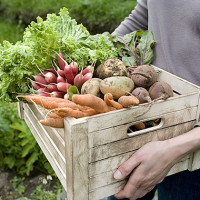This Thanksgiving my family and I will be enjoying a rich and delicious piece of American history called Bourbon Red. No, it is not whisky, but a heritage turkey that was first developed in Bourbon County, Ky., from wild and domesticated North American turkeys. Other breeds of heritage turkeys with names like Narragansett, Jersey Buff, Blue Slate and Black Spanish are making a comeback after being virtually ignored for the past 50 years in favor of the more commercially adapted Broad Breasted White turkey.
In fact, the ubiquitous Broad Breasted White was first developed and bred right here in our own backyard. These flightless behemoths command over 99.99 percent of the market for turkeys in the USA. They have been bred for breast size, speed of production and mass-market appeal, but, alas, not for flavor.
Before the industrialization of turkeys in the 1960s, the country ate only heritage turkeys, which were called simply “standard breed.” There were many more turkey farms spread out all over the country, just like there were many small family farms of all types.
Unfortunately, most of us have grown up without knowing how good a turkey can taste. We brine, barbecue and deep-fry our turkeys in efforts to give them more flavor. Heritage turkeys have a deep turkey flavor. The meat is richer and moister and more succulent, making brining unnecessary. These birds are raised slower and in a more natural environment, which contributes to their taste.
The turkey we will be eating this Thanksgiving is one of 190 turkeys lovingly raised right here in Sonoma County by 10 different young 4-H members and their families. This project is organized and financially supported by Slow Food Russian River. Jim Reichardt from Liberty Ducks in Petaluma, a Slow Food Russian River member, will be processing the birds free of charge. When I spoke to Jim today, there were 70 birds still available. But, these will certainly go fast. Last year, the youngsters raised only 85 birds, which sold out immediately. Their enthusiasm and commitment is growing, so we can look for increasing numbers of turkeys in the years to come.
Slow Food USA added a number of these heritage turkeys to their “Ark of Taste,” which encourages us to eat foods on this list to maintain biodiversity. This means that not only can we have something unique and delicious to eat, but also we insure that these valuable foodstuffs will be available for future generations. Since 1900, we have lost over 90 percent of our crop diversity. I don’t think any of us would like to have only one apple variety to choose from. By simply buying different foods, we support the farmers who grow them and do our part to save them for the future. But, the best part is we get to eat something fantastic and distinctive.
The turkey situation mirrors the larger issue of having our food supply concentrated in too few farms with too little crop diversity. Just 30 different plants feed 95 percent of the world. This is not how it used to be. We had far greater choices in what we ate 100 years ago.
Here in Sonoma, we are lucky to be so close to where our food is grown. Go to the farmers market and you will see how many of us value what the farmers do for us. We can personally talk to the farmer who produces our food. This connection is vital in supporting and encouraging small growers. Of course it costs more to raise our food on small farms. But, the price we pay for genetic monotony is far greater.
Order your heritage turkeys by going to the Slow Food Russian River Web site (slowfoodrr.org). There is a form to download and mail in. If they are sold out, you can purchase a bird from localharvest.org. or marysturkeys.com. The American Livestock Breeds Conservancy (albc-usa.org) is a nonprofit organization that protects endangered breeds of farm animals. They have lots of information on heritage turkeys.
We welcome your feedback. For general feedback or to contact one of our columnists, please visit the Columns page at www.sonomasun.com.






